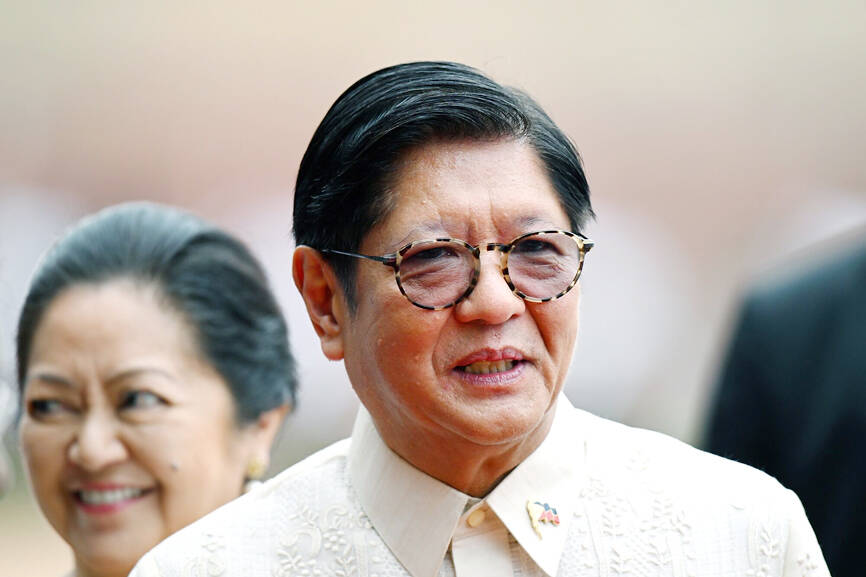The Ministry of Foreign Affairs (MOFA) yesterday thanked the Philippine Department of Foreign Affairs for reiterating Philippine President Ferdinand Marcos Jr’s statements on the importance of peace and stability in Taiwan Strait.
The department on Friday released a statement saying that Marcos expressed Manila’s longstanding position on the importance of peace and stability in Taiwan and the peaceful settlement of differences.
In an interview in New Delhi on Wednesday last week with the Indian news site Firstpost, Marcos said the Philippines is concerned about the safety and welfare of more than 150,000 Filipinos living and working in Taiwan, the department said.

Photo: Bloomberg
“Citing geographic proximity, the president stressed that any conflict in Taiwan could have an impact on the Philippines,” it said.
The foreign affairs department’s statement again explicitly expressed its support for peace and stability in the Taiwan Strait, as well as Taiwan’s importance to the Philippines, the ministry said.
“It highlights that peace and stability in the Taiwan Strait is a shared concern among countries in the region,” it said.
The ministry said it highly appreciates the statement and emphasizes that Taiwan, under the “integrated diplomacy” strategy, would continue to deepen its substantial cooperative relationship with the Philippines, and together work toward regional peace and prosperity.
Separately, the ministry yesterday welcomed to Taiwan a delegation of Latvia-Taiwan Parliamentary Friendship Group members, led by the group’s chairwoman Ingrida Circene.
The eight-member delegation, which is to stay until Thursday, is the first Latvian parliamentary group to visit Taiwan in the past few years, the ministry said.
Taiwan and Latvia share the values of freedom and democracy, so hopefully their visit would bring mutual benefits in cooperation across different fields, as well as bolster parliamentary friendship on both sides, it said.

ALIGNED THINKING: Taiwan and Japan have a mutual interest in trade, culture and engineering, and can work together for stability, Cho Jung-tai said Taiwan and Japan are two like-minded countries willing to work together to form a “safety barrier” in the Indo-Pacific region, Premier Cho Jung-tai (卓榮泰) yesterday said at the opening ceremony of the 35th Taiwan-Japan Modern Engineering and Technology Symposium in Taipei. Taiwan and Japan are close geographically and closer emotionally, he added. Citing the overflowing of a barrier lake in the Mataian River (馬太鞍溪) in September, Cho said the submersible water level sensors given by Japan during the disaster helped Taiwan monitor the lake’s water levels more accurately. Japan also provided a lot of vaccines early in the outbreak of the COVID-19 pandemic,

Kaohsiung Mayor Chen Chi-mai (陳其邁) on Monday announced light shows and themed traffic lights to welcome fans of South Korean pop group Twice to the port city. The group is to play Kaohsiung on Saturday as part of its “This Is For” world tour. It would be the group’s first performance in Taiwan since its debut 10 years ago. The all-female group consists of five South Koreans, three Japanese and Tainan’s Chou Tzu-yu (周子瑜), the first Taiwan-born and raised member of a South Korean girl group. To promote the group’s arrival, the city has been holding a series of events, including a pop-up

TEMPORAL/SPIRITUAL: Beijing’s claim that the next Buddhist leader must come from China is a heavy-handed political maneuver that will fall flat-faced, experts said China’s requirement that the Dalai Lama’s reincarnation to be born in China and approved by Beijing has drawn criticism, with experts at a forum in Taipei yesterday saying that if Beijing were to put forth its own Dalai Lama, the person would not be recognized by the Tibetan Buddhist community. The experts made a remarks at the two-day forum hosted by the Tibet Religious Foundation of His Holiness the Dalai Lama titled: “The Snow Land Forum: Finding Common Ground on Tibet.” China says it has the right to determine the Dalai Lama’s reincarnation, as it claims sovereignty over Tibet since ancient times,

Temperatures in some parts of Taiwan are expected to fall sharply to lows of 15°C later this week as seasonal northeasterly winds strengthen, the Central Weather Administration (CWA) said today. It is to be the strongest cold wave to affect northern Taiwan this autumn, while Chiayi County in the southwest and some parts of central Taiwan are likely to also see lower temperatures due to radiational cooling, which occurs under conditions of clear skies, light winds and dry weather, the CWA said. Across Taiwan, temperatures are to fall gradually this week, dropping to 15°C to 16°C in the early hours of Wednesday